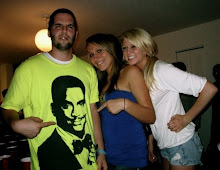http://www.youtube.com/watch?v=1z8gCZ7zpsQ
http://www.youtube.com/watch?v=QTJxj7a9-DA
http://www.youtube.com/watch?v=tQhnKs09lHE&feature=related
Paparazzi scuffles aren’t the only outbursts the media have portrayed negatively of Kanye West. There are certain instances where Kanye West has been known to have a few backstage blow ups and on stage blow ups. In 2004 Kanye West lost the ‘best new artist’ award to country singer Gretchen Wilson and stormed out of the show verbally complaining. In 2006 Kanye West was attending the MTV Europe Music Awards and was awarded ‘best hip hop artist award’ unfortunately he lost ‘best video’ to a French group. Outraged, he stormed the stage to interrupt the group’s acceptance speech to claim “if I don’t win the award show losses credibility.” A year later in 2007 he was nominated for 5 VMA’s and was awarded none of them. When it was known that he was going away empty handed for the second year in a row he threw a fit backstage yelling “Give a black man a chance.” He then stated he would never come back to an MTV award show. Once the media gets a hold of these incidences they go to town on the negative publicity. Is this fair? I believe at the time Kanye west fans were split 50/50. Some believed he was wrong for acting so childish while other fans seemed to agree that he deserved the awards he was nominated for. If the public is split 50/50 on a certain subject what side should the media take on the matter? And should it matter if these incidents happen all the time or if it’s a just one time thing? I believe once it is known that this is how the person acts all the time it sheds bad light on the person and gives the public a reason to dislike them and although at the time I could understand why people disliked Kanye I was still a fan and believed he deserved recognition for his contributions to the music industry. Although the publicity was negative I believe Kanye liked it because as they say “all publicity is good publicity” or so I thought. Now comes the Taylor Swift incident in 2009. I will be the first to say that there was/is no excuse for the way Mr. West over reacted. I believe that this public incident was his biggest downfall and I would argue that he is still dealing with issues that rose from this incident. In this instance I totally agree with the media portraying him as a negative pop figure, even after the apologies. It’s hard to apologize for something you do all the time and make it seem sincere. But, although I agree, along with most people, with the way the media showed Kanye to the public after the Taylor Swift fiasco that doesn’t mean that they are right or fair. One guideline within the Code of Ethics is ‘Be sensitive when seeking or using interviews, videos or photographs of those affected by tragedy or grief.” When the media discussed his actions they never brought up that he lost his mother within the same year. Is this because it softens their argument of his over reactions or is it because he had over reacted so many times that it shouldn’t make a difference? I feel with these events it was fair for the media to use the “majority” code because so many people felt effected by what he did and it was a wakeup call to Kanye to let him know he isn’t as liked as he thinks. But, not all instances should be judged by what the majority thinks.





